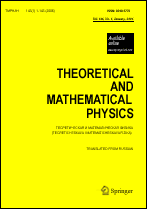|
This article is cited in 124 scientific papers (total in 124 papers)
Quantum versus classical uncertainty
S. L. Luoab
a Chinese Academy of Sciences
b Carleton University
Abstract:
The uncertainty of an observable in a quantum state is usually described by variance. This description is well suited when the states are pure. But when the states are mixed, things become subtle, and the variance is a hybrid of quantum and classical uncertainties. Motivated by the notion of Fisher information in statistical inference, we establish a decomposition of the variance into quantum and classical parts. The key observation is that the Wigner–Yanase skew information (a distinguished version of quantum Fisher information) can be interpreted as a measure of quantum uncertainty. We also establish a decomposition of the conventional covariance into quantum and classical parts. The results provide a new perspective for understanding uncertainty and correlation and are used to quantify entanglement, as well as to establish a new uncertainty relation in purely quantum terms.
Keywords:
uncertainty, classical uncertainty, quantum uncertainty, skew information, quantum correlation, entanglement, uncertainty principle.
Received: 29.06.2004
Citation:
S. L. Luo, “Quantum versus classical uncertainty”, TMF, 143:2 (2005), 231–240; Theoret. and Math. Phys., 143:2 (2005), 681–688
Linking options:
https://www.mathnet.ru/eng/tmf1812https://doi.org/10.4213/tmf1812 https://www.mathnet.ru/eng/tmf/v143/i2/p231
|


| Statistics & downloads: |
| Abstract page: | 774 | | Full-text PDF : | 388 | | References: | 96 | | First page: | 1 |
|




 Contact us:
Contact us: Terms of Use
Terms of Use
 Registration to the website
Registration to the website Logotypes
Logotypes









 Citation in format
Citation in format 
